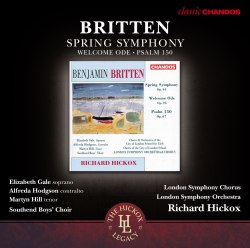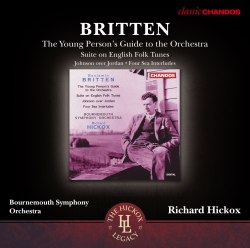|

Support
us financially by purchasing this disc from |
|
|
|
|
|
|

Support
us financially by purchasing this disc from |
|
|
|
|
|
|
|
Benjamin BRITTEN (1913-1976)
Spring Symphony, Op.44 (1949) [44:44]
Welcome Ode, Op.95 (1976) [8:16]
Psalm 150, Op.67* (1962) [5:31]
Elizabeth Gale (soprano), Alfreda Hodgson (contralto), Martyn Hill (tenor)
City of London School Choir (Boys), City of London School for Girls
Choir, London Symphony Chorus, Southend Boys Choir, *Orchestra of the
City of London School for Girls, London Symphony Orchestra/Richard
Hickox
rec. 8-10 January and 27 March 1990, St. Jude’s Church, Central
Square, London NW1. DDD
English texts included
CHANDOS CHAN10782X [58:48]
The Young Person’s Guide to the Orchestra, Op.34 (1946) [17:16]
Suite on English Folk Tunes ‘A time there was...’, Op.90
(1974) [15:35]
Suite from ‘Johnson over Jordan’, arr. Paul Hindmarsh (1939)
[17:01]
Four Sea Interludes from ‘Peter Grimes’, Op.33a (1945) [16:45]
Bournemouth Symphony Orchestra/Richard Hickox
rec. 18-19 March 1993, Winter Gardens, Bournemouth. DDD.
CHANDOS CHAN10784X [67:04]
I missed both these discs when first they were issued in the early
1990s, probably because I already had several versions of most of
the pieces in my collection. The discs were originally issued as CHAN8855
(Spring Symphony) and CHAN9221 and are now reissued in 2013
re-masterings as part of The Hickox Legacy series. The timing of the
reissues could not be more appropriate in Britten’s centenary
year and one wonders if Chandos will reissue more of Hickox’s
Britten recordings this year; his excellent recording of War Requiem
must surely merit a place in this Legacy series.
There have been several fine recordings of Spring Symphony
over the years, including the composer’s own performance for
Decca (1960, the work’s first studio recording) and Previn’s
1978 EMI account. This Hickox reading must be up there with the best.
He has a very good team of soloists, among whom Alfreda Hodgson is
outstanding - especially in ‘Out on the Lawn I lie in Bed’.
The LSO Chorus is on top form, as is the LSO itself, and I think any
listener will be impressed by the tension that chorus and orchestra
generate, at Hickox’s behest, in the extended Introduction section.
The contribution of the Southend Boys Choir is superb. In Part I they
launch into ‘When as the rye’ with infectious zest, justifying
annotator Lewis Foreman’s description of this “joyous
guttersnipe setting”. Towards the end of the work the enthusiasm
with which they sing ‘Sumer is icumen in’ is a delight,
as is the tumultuous way in which Hickox and his ensemble deliver
the finale as a whole.
The disc is completed by two works that demonstrate Britten’s
genius for writing music for young people that stretches them without
ever patronising them. The Welcome Ode was his last
completed work and the Senior Choirs of the two London schools sing
it excellently, aided and abetted by the LSO. When it comes to the
ebullient setting of Psalm 150, which features the junior choir
of each school, there isn’t a professional musician in sight
apart from Hickox and the LSO’s then-timpanist, Kurt-Hans Goedicke
for the accompaniment is in the hands of a school orchestra and a
jolly fine job they and the choirs make of it.
Voices are entirely absent in the works on the other disc, which contains
two of Britten’s best-known and -loved orchestral scores. Here
Hickox conducts the Bournemouth Symphony Orchestra, whose Principal
Guest Conductor he was at the time these recordings were made. The
Young Person’s Guide to the Orchestra is a masterly
set of variations and an equally masterly exploration of the resources
of the modern symphony orchestra. The present performance is a sparkling
one, enhanced by the rich Chandos recording. All the individual variations
come off splendidly - and I award a plaudit to Chandos for tracking
each one separately. The fugue scampers along and the moment when
the brass majestically reprise Purcell’s theme over the whirling
fugue makes its due impact: that’s one of those moments in music
that, in my experience, usually stirs the listener no matter how often
one has heard it.
Hickox also leads a fine account of the Four Sea Interludes
- what a shame he didn’t include the Passacaglia also. He achieves
a splendid atmosphere in ‘Dawn’ and the music of ‘Sunday
Morning’ becomes increasingly urgent as the piece unfolds. Finally
Hickox unleashes a menacing, turbulent ‘Storm’, the impact
of which is heightened considerably thanks to the superb Chandos sound.
The Suite on English Folk Tuneswas Britten’s last
orchestral work, completed in 1974. However, its origins lie in an
earlier composition, ‘Hankin Booby’, which he composed
in 1967 for the opening of the Queen Elizabeth Hall in London. That
piece became the third of the Suite’s five movements. The Suite
is dedicated to the memory of Percy Grainger and, given the original
and imaginative Grainger-like way in which Britten treats folk songs
in this work, there could be no more appropriate homage. The quirky
woodwind writing in ‘Hankin Booby’ is highly reminiscent
of A Lincolnshire Posy and that’s even more true of the
fifth movement, ’Lord Melbourne’. That concluding movement
takes the Suite onto an altogether higher plane than the music that
has gone before, fine though that is. This Bournemouth performance
of the Suite is excellent.
The rarity here is the music from Johnson over Jordan.
I learned from Andrew Burn’s valuable notes that this was an
experimental 1939 play by J.B. Priestley for which Britten wrote the
incidental music - following very precise instructions from Priestley,
it seems. So far as I know the play has sunk without trace. Some of
Britten’s music was salvaged by Paul Hindmarsh who fashioned
a four-movement suite from the original score in 1990. I rather suspect
this was the first recording. It’s interesting music, which
Hindmarsh did well to rescue, though it’s not exactly earth-shattering
stuff. I particularly enjoyed the third movement, ‘Spider Dance.
Spider and the Fly’, which is marked Lento quasi Blues.
This is a highly entertaining and rather effective pastiche of 1930s
dance band music and Andrew Burn tells us that before composing it
Britten consulted the well-known band leader, Geraldo.
These are two excellent Britten anthologies conducted by a man who
was a noted Britten interpreter. I’m very glad that, however
belatedly, I’ve now heard them. The standard of performances
is consistently high and Chandos have recorded both programmes in
characteristically fine sound. In both cases the booklet notes are
well worth reading - Lewis Foreman contributes the notes for the Spring
Symphony disc. Even if you have some of the repertoire in your
collection already I’d suggest you don’t make the mistake
I made when these discs were first released and pass them by: both
are well worth your attention.
John Quinn
See also download
review by Brian Wilson
Britten discography & review
index
 |
 |
|



 All Nimbus reviews
All Nimbus reviews








